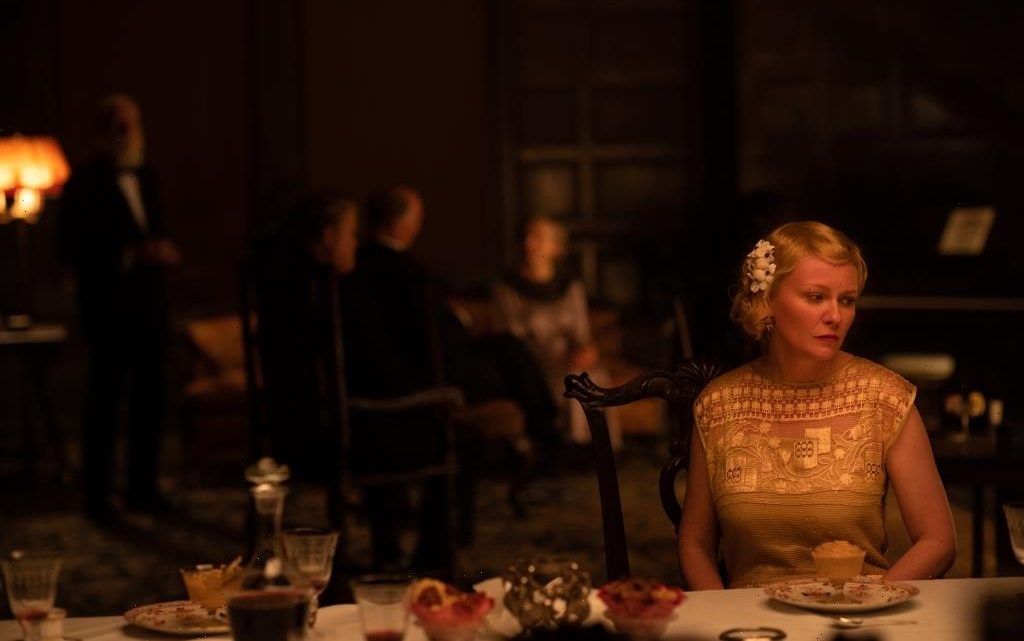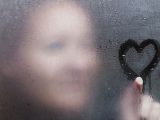
Kirsten Dunst On “Finding That Inner Insecurity” To Play Rose In ‘The Power Of The Dog’
12/09/2021“I’m sorry,” says Kirsten Dunst, “you’re going to have to be quiet.” She’s talking to her two children—Ennis, 3, and James, who was born last May. “I’m just letting them know that I’m not talking to myself, I’m just talking about myself,” she laughs. “What were you saying again?”
Fortunately, though she’s juggling a telephone and two infants while she’s meant to be getting herself ready for Jimmy Kimmel Live, Dunst is not easily distracted. Turning 40 next spring, she’s been in the business for more than 30 years now, since her debut in the 1989 compendium film New York Stories—and where lesser talents might have flamed out or flaked out, Dunst only seems to become more focused. The proof of this is in her performance in Jane Campion’s new film The Power of the Dog, based on Thomas Savage’s 1967 Western novel, in which she plays Rose, a widow who marries into the Burbank family. Rose’s son Peter (Kodi Smit-McPhee is fey and effeminate, which enrages her new brother-in-law Phil (Benedict Cumberbatch). Phil’s glowering, possibly closeted disapproval, coupled with the increasing absence of her husband (Dunst’s real-life partner Jesse Plemons), drives the poor woman to drink.
Plemons was cast first, and Rose nearly went to Elisabeth Moss until The Handmaid’s Tale got in the way, but Dunst had been in Campion’s sights for a while. “She wrote me a letter in my early twenties,” Dunst says, “saying that she loved The Virgin Suicides and Marie Antoinette and that she wanted us to work together. It was an Alice Munro short story called Runaway that she wanted us to workshop together. But then, who knows? I don’t know if it was a rights thing, but nothing ever came of it.”
As with that proposed project, Power was very much a collaboration between actor and director. “As an actor, I really had to fill a lot of gaps in a small space,” she recalls. “But Rose was more loved in Jane’s script than the actual book—there wasn’t much to draw from there, except for the history of my son and me. So, in terms of Rose’s descent, it was really about creating her demons. What would drive someone to drink? She’s so uncomfortable in that house. She doesn’t even leave her bedroom. So, it was about finding that inner insecurity, that bad place, that self-destruction of the mind.”
It helped, she recalls, that the sets were so authentic. “We did all the exteriors first, in the South Island of New Zealand, where the mountain range was the most like a Montana setting. And the ranch that was built was one of the most incredible sets I’ve ever seen. It felt like you could actually live there. The amount of love and care that went into it was pretty remarkable to me. You could open any drawer and there’d be little old books, or some poems. It felt very real wherever you were.”
The schedule, however, was a lot less helpful. “I didn’t work every day,” she says. “I’d have five days off, then I’d have to burst out of the house, screaming. It was hard for me to get into a flow in the beginning, because I had so much time on my hands—which I really don’t like—and then these really big emotional scenes. I just felt a lot of pressure. I mean, it’s a Jane Campion movie! She hadn’t made a movie in 12 years, and I didn’t want to let her down. And I think I might have magnified that pressure, because the person I was playing was so insecure and it kind of rubbed off on me a little bit, in terms of the way I felt about my acting and myself. So, it was very nice to have Jesse on the set with me, to have my back or give me a hug.”
Dunst seems at home in this kind of era, as she had in Little Women (1994) and The Beguiled (2017), but she isn’t especially drawn to the period. “To me, it’s the director,” she says. “I really would play any role. I don’t really have anyone I’m dying to play.” Perhaps tellingly, the directors that seem to get the most out of her tend to be women—notably Sofia Coppola, who single-handedly reinvented Dunst in 1999 with The Virgin Suicides, an elegant, pitch-perfect study of burgeoning teenage sexuality.
“I really think working with Sofia at such a young age, at 16, gave me the feeling that I was beautiful,” she says. “I looked up to her so much. I thought she was—and I still do—just the coolest girl. She was the queen bee, an older sister to me, so the fact that she thought I was pretty, or cool—getting that validation from a woman you think is the coolest means you don’t need it from male directors. You know what I’m trying to say—it’s like, I didn’t have to be looked at through the male gaze to feel like, ‘I’m sexy.’ Sofia made me feel that way. My coming-of-age film, when people first saw me differently, was The Virgin Suicides. And that was through a female director’s eye, which is so different to how a male director would have seen me, I would think.”
It’s at this point that Dunst’s mother walks into the backyard, just as the conversation turns to #MeToo, Harvey Weinstein and the predatory nature of the film industry. “Cue Inez Dunst!” she laughs. “My mother was always with me, and I went to a normal school, so I felt always protected, actually. And, I’m sorry, everybody knew Harvey was who he was. There was literally no surprise. I remember once my manager saying, ‘Harvey doesn’t think you like him,’ and I was like, ‘So what? I’m not kissing his ass!’
“I always knew he was kind of gross,” she says. “Even my young teenage self knew that. I just thought, ‘I’ll keep my distance.’ But I never was put in a situation where I felt vulnerable, where I was alone with someone. I had one inappropriate question by a director when I was younger, and maybe an older guy tried to hit on me at a party once, but I knew it was gross. And because I had Sofia as a role model, and because I went to normal schools and I had my own friends, it kept me safe. And I didn’t feel like, ‘Oh, I have to dress sexy for the red carpet.’ I was like, ‘I’m going to wear whatever I want!’”
She has always been confident, she thinks, but in retrospect, she didn’t always have a thick skin. That came later, after Marie Antionette, her second collaboration with Coppola, in 2006. “I saw the movie before it came out,” she remembers. “I was alone in the theater, and I just loved it. I was really so proud. And…”
And then the reviews came in, and they were less flattering.
“It bummed me out,” she says, “because it was so personal to me. I thought, Did I let everyone down? But ultimately, I was playing the essence of the character, a perfume of it. It wasn’t like we were making a historical drama.” She pauses. “Listen, if that film came out now, it’d be a different story. We were clearly ahead of the time, and we were celebrating a female director, too. Now, it’s cool, but then it was like, ‘Oh, you can’t play with the boys yet.’ I think that was part of it. I think it was threatening.”
Worse was to come in 2011, when Dunst attended the Cannes film festival with Lars Von Trier’s Melancholia. The Danish director’s trademark gallows humor went horribly wrong with a flippant remark about his German roots (“I’m a Nazi!” he joked, to the horror of the world’s least cine-literate press). Dunst is still proud of his film and thinks of him fondly (in a strange quirk of fate, she shares a birthday with him and Campion). “Lars is a very vulnerable filmmaker when he is working with you,” she says. “He’s ready to share his stories and he’s very fragile, so you feel like you want to protect him.”
So, this time round, the bad press didn’t set her back so much. “None of this stuff really matters,” she says matter-of-factly. “Your experience is really all you have. It’s all you have. As you grow up, you become more confident in what you’re doing, and you also realize that the person reviewing the movie, well, their word is not the be all and end all, either. If someone likes the movie or not, that’s very personal, too. Usually, the ones that everyone agrees on are usually pretty middle of the road. So, if you’ve made something that’s upset people, then I think you’ve probably made something great.”
At a time when many actors are looking back, Dunst is looking firmly forward—in fact, her best work may be ahead of her, given the awards talk around The Power of the Dog and recent Sony series On Becoming a God in Central Florida. She’s even thinking about directing, but only when the kids are older. “I would love to,” she says. “I was going to do The Bell Jar and that fell through, but I think I will. My children are too young for me to spend an entire year making a movie. But I’ll do it. I will.”
Must Read Stories
Alec Baldwin Posts Letter From Film’s Crew That Denies Allegations Of Unsafe Set
‘And Just Like That…’ Review: As Hard As HBO Max Sequel Series Tries, It’s Just Not All That
Spielberg’s ‘West Side Story’ Rumbling Toward $31M Global Start: Weekend Preview
First Look At ‘Law & Order’ Flagship As Dick Wolf Series Returns To Production
Read More About:
Source: Read Full Article










